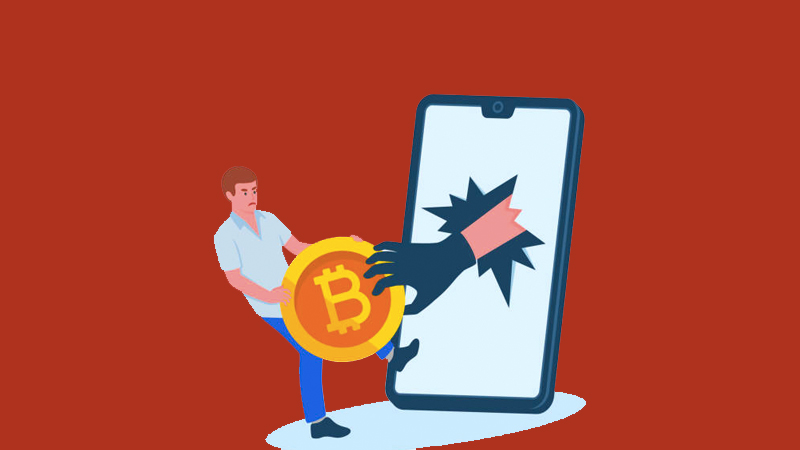7 Crypto Scams and How to Avoid Them
It’s no secret that cryptocurrency (or digital currency in general) is a booming market right now. There are thousands of cryptocurrencies available worth over $1 trillion total and many new cryptocurrencies are created every single day. With this much money at stake, it’s worth it for criminals to try to take advantage of people through cryptocurrency scams.

7 Crypto Scams and How to Avoid Them
In fact, cryptocurrency crimes have reached astronomical numbers over the last couple of years. In 2021, over $14 billion worth of crypto was taken from unsuspecting investors through scams and frauds.
Scammers are also getting more sophisticated over time. They are constantly coming up with ways to trick unsuspecting people and steal hard-earned money. So, this has left many people wondering how to avoid cryptocurrency scams. Here are some common methods that scammers use and how you can protect yourself from them.
1. Phishing Scams
Phishing scams are one of the most common forms of cryptocurrency crimes. These scams are designed to trick you into giving away your personal information, and they can be very convincing. They often come in the form of emails, SMS messages, or phone calls from people who claim to represent a legitimate cryptocurrency exchange or wallet provider. The message will ask you for your wallet credentials such as password, seed words, and private key.
They may also request access to your computer so that they can install malicious software that would allow the scammers to access your wallet information. Once scammers have your information, they will take everything in your wallet and transfer it to their own accounts. If scammers take over your account and steal funds, there is no way to get them back.
How To Protect Yourself
Always be wary of unsolicited contact from someone claiming to represent a cryptocurrency exchange or wallet provider. If you receive a message that looks suspicious, do not respond to it. Do not click on the link and do not open any attachments that are sent with the message. Moreover, do not give out your personal information or wallet credentials to anyone over the phone or online. Also, if possible, don’t give access to your computer or mobile device to anyone claiming to be a technical support agent.
2. Giveaway Scams
Many cryptocurrency exchanges and celebrities often run a giveaway or contests to promote their brand. In these giveaways, the winner gets an amount of cryptocurrency as a reward for participating. The problem is that scammers often take advantage of these promotions.
This scam typically appears in online forums and social media groups, where scammers post messages about receiving large amounts of bitcoin or other cryptocurrencies. They ask people who want to get in on the action to send them some amount of cryptocurrency first. In reality, these giveaways are scams and once they have your money, they will disappear without sending anything back.
How To Protect Yourself
In the cryptocurrency world works, there are no upfront fees or payments required to get started. If an exchange or celebrity asks for money before sending out the prize then it’s likely a scam. So, never pay money upfront for any crypto-related service. If you’re interested in entering a contest, do so directly through the official website rather than following links sent by email or via social media platforms such as Facebook and Twitter.
3. Investment Scams
As the popularity of cryptocurrency has increased, so too has the number of investment scams. Some scam artists will use fake ICOs or pump-and-dump schemes to get investors to part with their money without ever providing any real value in return.
It’s important to note that not all ICOs are scams, but it’s also difficult to tell the difference between a legitimate project and one that’s just trying to get your money. Scammers may promise high returns or use complex language and incomprehensible whitepapers to confuse investors into thinking they’re investing in the next Bitcoin when in reality, they’re making a bad investment decision.
There have been many cases of scammers using fake websites, social media accounts, and fake celebrity endorsements to promote their bogus investments. They’ll promise high returns on a small investment but never deliver what was promised.
How To Protect Yourself
You should always do your research before investing in anything and be sure that you understand all the risks involved with each investment opportunity before sending any funds.
4. Fake Apps and Websites Scams
Fake apps and sites are another way scammers can steal your cryptocurrency. They create fake apps and sites that look like legitimate wallets or exchanges but are actually malware programs designed to trick you into giving them access to your account credentials. Once you do, scammers steal your login information and use it to transfer funds from your real wallet or exchange account into their own.
How To Protect Yourself
You should never download apps or visit websites from untrusted sources and not just click links in a text message or email. Make sure that any app or site you’re using is legitimate before providing any personal information or logging in with your cryptocurrency credentials. Always check that the app is verified by a trusted source like Google Play or Apple’s App Store before downloading it. Always check the URL of any website before using it, and make sure there are no spelling errors in the URL.
5. Blackmail Scams
A common scam that is often used in conjunction with ransomware attacks is blackmail. Blackmail scams are similar to ransomware, but instead of encrypting files and then demanding payment for their release, the attackers will send a message saying that they have access to sensitive information about you. This information could be anything from photos or videos of you engaging in illegal activity to a compromising image taken from your webcam while you were using a computer that was infected with malware. The scammers will use the information to blackmail you, threatening to release it if they aren’t paid a sum of cryptocurrency.
How To Protect Yourself
If the attacker has access to sensitive information, they’ll be able to use it against you regardless of whether or not you pay them. Also, there is no way to guarantee that paying your attacker will protect any sensitive data from being leaked into the public domain.
If you do receive a blackmail message, do not reply and ignore it. Do not send any money to the hackers instead, report the incident to an authority such as your local police station.
6. Employment Scams
In an employment scam, the scammers pretend to be a company or recruiters hiring for a job opening. And then asking applicants to send crypto in order to cover expenses such as initial training fees or other costs associated with hiring someone. These scams often appear on classified websites and job boards where employers are looking for new employees.
Scammers may also send out email messages with a job offering attachment containing a malicious file or link that can infect your computer when opened. The link may direct you to a fake website where you’re asked to fill out an application form that will collect sensitive information.
How To Protect Yourself
When applying for jobs online, it’s important to verify the legitimacy of any company before applying or submitting any personal information, or sending any money. This can be done by doing research into their history and reputation online, reading reviews from previous customers and employees, and checking out their website for any red flags such as spelling errors or poor design.
7. Romance scams
Romance scams are a common type of online scam where the perpetrator creates an online profile using fake photos and personal details to build a relationship with their victims over a period of time before asking them for money.
They tend to target victims who are lonely and looking for companionship, romance, or love online. This can be done through dating websites, social networking sites, or chatrooms.
The scammer will claim to be in some trouble, often involving a family member who is sick or dying, and ask you for money. It is a continuous cycle, and once the victim has sent money, the scammer will be asked for more until the victim realizes what has happened or stops sending funds altogether.
How To Protect Yourself
When using dating websites and apps, you should always meet in person with anyone you’ve been talking to online before sharing any personal information. Be wary of promises of love, marriage, and financial assistance that come too quickly, and never send money to someone you have never met face-to-face.
Conclusion
Despite being completely decentralised and anonymous, the crypto community is no different from the real world with respect to scams. Also, the number of scams and frauds in the crypto space is overwhelming. It’s bad enough if someone loses a few dollars of crypto here or there, but it’s another story if they end up running full force into a scam while risking thousands of dollars worth of crypto investments at the same time. As such, we encourage everyone to be very careful—and this guide should help minimise your chances of falling victim.
References
- https://us.norton.com/internetsecurity-how-to-cryptocurrency-scams.html#
- https://time.com/nextadvisor/investing/cryptocurrency/common-crypto-scams/
- https://www.fool.com/the-ascent/cryptocurrency/articles/6-tips-to-avoid-crypto-scams/
- https://www.sanjosebusinesslawyersblog.com/10-common-crypto-scams-and-how-to-avoid-them/
- https://www.thetimes.co.uk/money-mentor/article/cryptocurrency-scams/
- https://www.experian.com/blogs/ask-experian/how-to-avoid-cryptocurrency-scams/#s1
- https://blog.coinbase.com/crypto-giveaway-scams-and-how-to-spot-them-59e24d220616
Written by The Original PC Doctor on 28/11/2022.





















































































